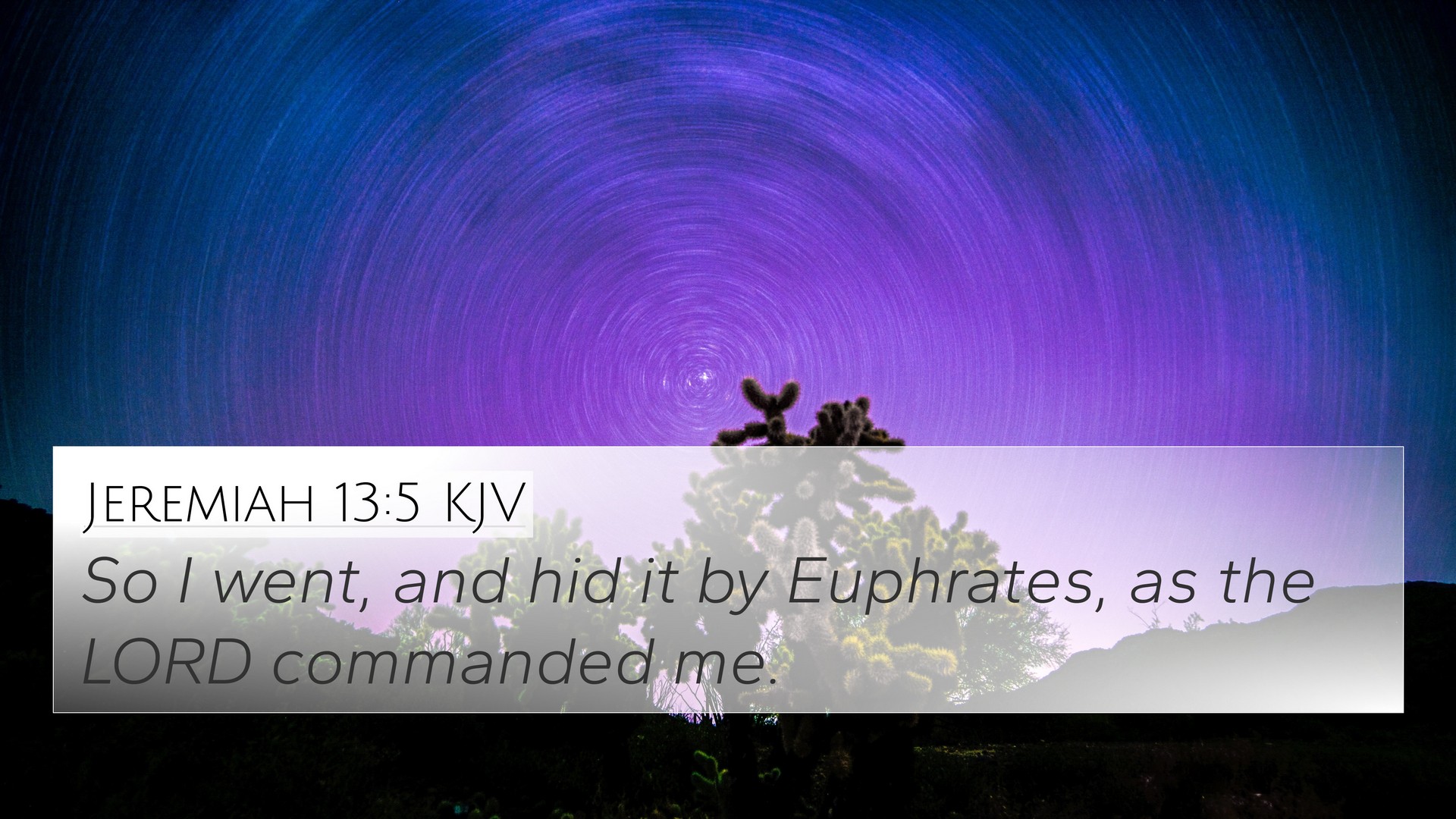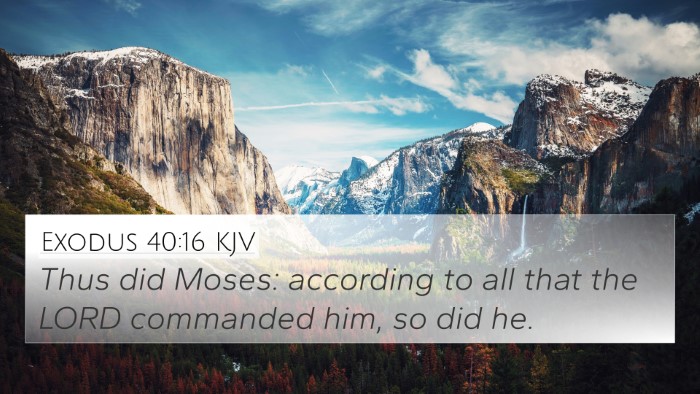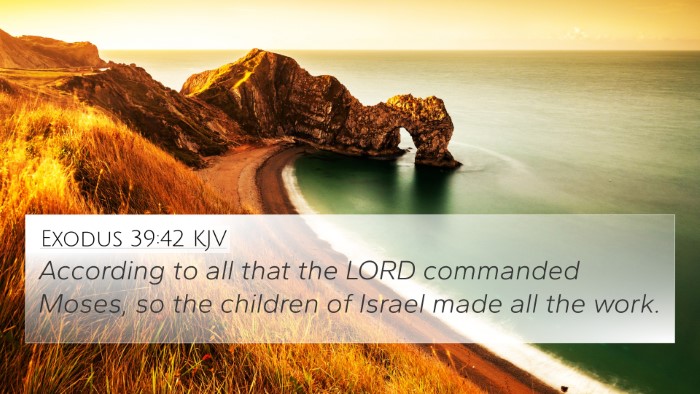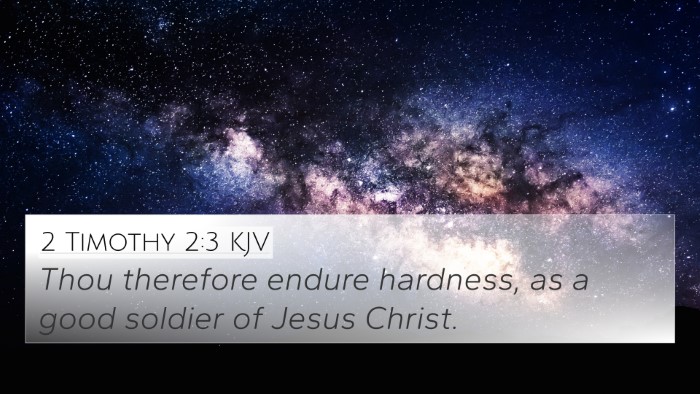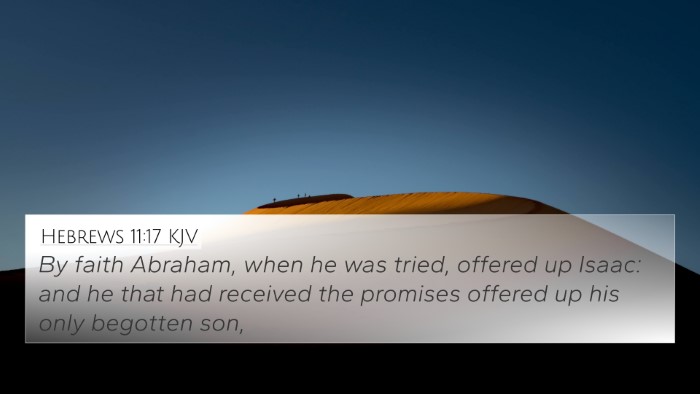Understanding Jeremiah 13:5
Jeremiah 13:5 states: "So I went, and hid it by Euphrates, as the LORD commanded me." This verse holds profound meaning within the context of Jeremiah's prophetic ministry. Below, we explore the insights gleaned from public domain commentaries by Matthew Henry, Albert Barnes, and Adam Clarke to deepen our understanding.
Context of the Verse
The book of Jeremiah conveys the warnings and judgments from God during a tumultuous period in Israel's history. Jeremiah, known as the weeping prophet, was commanded to deliver messages of both destruction and hope, symbolizing God's enduring relationship with His people.
Verse Meaning
In Jeremiah 13:5, we see a specific command from God to Jeremiah. This directive reflects a tactile teaching method used by prophets: symbolic actions that demonstrate deeper truths.
-
Symbolism of Hiding the Girdle:
By hiding the girdle, a piece of clothing, Jeremiah illustrates the state of Israel—once valuable, now marred by sin and destined for ruin if unrepentant.
-
Obedience to God's Command:
The phrase "as the LORD commanded me" emphasizes Jeremiah's obedience, stressing the importance of following divine instruction in prophetic tasks.
Commentary Insights
Matthew Henry suggests that Jeremiah's actions are used to convey the message of decay and the necessary judgment awaiting Israel due to their unfaithfulness. The girdle represents pride, which has become useless.
Albert Barnes interprets the act of hiding the girdle as a demonstration of Israel's impending loss of dignity and worth because of their spiritual adultery and disobedience to God.
Adam Clarke elucidates that this command signifies not just a physical hiding, but a deeper spiritual reality: Israel's separation from God due to sin, paralleling the girdle's decay when removed from its purpose.
Bible Verse Cross-References
This verse connects with several others, showcasing the theme of idolatry, disobedience, and God's judgment. Below are some essential cross-references:
- Isaiah 30:1-3 - This passage warns of the consequences of seeking alliances instead of relying on God.
- Ezekiel 23:36-39 - Describes the betrayal of Israel, drawing parallels to unfaithfulness.
- Hosea 4:6 - Highlights a lack of knowledge of God leading to destruction.
- James 4:4 - Mentions friendship with the world as enmity against God.
- Luke 14:34-35 - Warns about the uselessness of salt that loses its flavor, akin to Israel's decay.
- Matthew 23:37 - Jesus expresses lament over Jerusalem, reflecting the ongoing divine sorrow over Israel's disobedience.
- Romans 11:22 - A reminder of God’s kindness and severity, applicable to the fate awaiting the disobedient.
- Revelation 3:15-16 - Speaks of the lukewarm church, drawing a parallel to Israel’s half-hearted devotion.
- 2 Chronicles 36:15-16 - Highlights God's persistent sending of messages to His people that were largely ignored.
- Galatians 6:7 - Reminds us that we will reap what we sow, a principle evident in Israel's plight.
Connections Between Bible Verses
The connections between these verses illustrate a broader theme of spiritual disciplines and prophetic warnings throughout Scripture. Understanding these inter-Biblical dialogues can provide clarity on the significance of obedience and the consequences of straying from God’s commands. Each of these verses serves as a thematic bridge connecting various aspects of Scripture, revealing God's continuous call for faithfulness.
Thematic Bible Verse Connections
When looking at thematic Bible verse connections, Jeremiah 13:5 stands firm within a narrative of disobedience, divine warnings, and the consequential outcomes of ignoring God. It reveals a pattern in Scripture where God's people are repeatedly urged to remain steadfast in faith and obedience. Cross-referencing Biblical texts offers a more profound understanding of God's will and the dire consequences of neglecting it.
Comparative Bible Verse Analysis
Through comparative Bible verse analysis, we can deepen our understanding of Jeremiah 13:5. Each referenced verse contributes to a fuller picture of God's relationship with His people, providing historical and prophetic context crucial for interpreting the intent behind divine instructions.
By utilizing tools for Bible cross-referencing, such as a Bible concordance or a Bible cross-reference guide, readers can successfully navigate these connections. This facilitates not only personal study but also equips individuals to engage with the Scripture effectively, leading to richer insights and teachings.
Conclusion
Jeremiah 13:5 serves as a pivotal moment in understanding God's message of judgment and grace. The insights from public domain commentaries help reveal the deep significance of God's commands and the broader thematic connections involved. As one explores the Biblical text further through cross-referencing, they uncover profound messages that resonate throughout the scriptures, leading to transformative insights into their faith journey.
